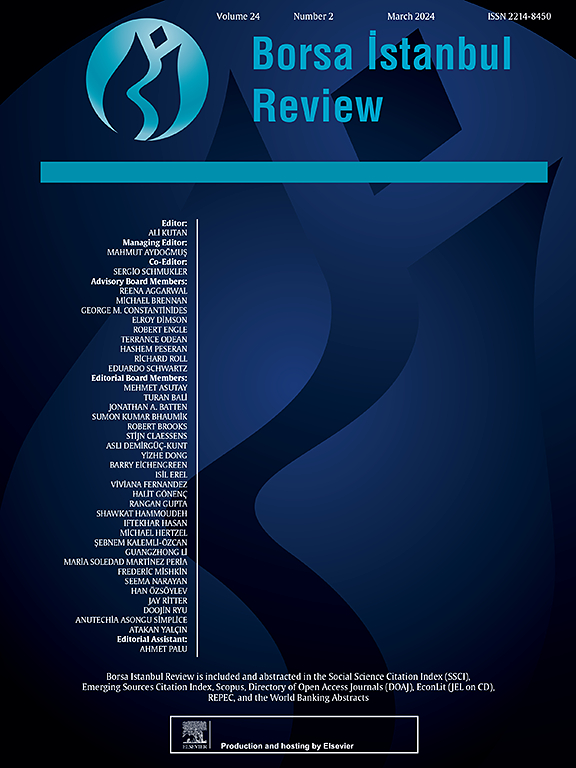Trading halts and the advantage of institutional investors: Historical evidence from Borsa Istanbul
IF 6.3
2区 经济学
Q1 BUSINESS, FINANCE
引用次数: 0
Abstract
The effects and effectiveness of trading halts remain controversial among academics and regulators. This paper provides historical evidence regarding the efficacy of trading halts from a leading emerging market with a unique microstructure, Borsa Istanbul (Istanbul Stock Exchange), by examining the return, volatility, and volume behavior around news-initiated trading halts using trade-by-trade data and 15-min intervals from January 1999–April 2003. It also investigates, for the first time, the trading behavior of different types of investors, such as individuals, mutual funds, and brokerage houses, around trading halts. Findings indicate that most of the new information is absorbed by prices within 15 min following the resumption of trading after a halt. The reaction of investors to bad news is slower and stronger than good news. Despite halts, institutional investors employ the price advantage of new information during the cessation period ahead of individual investors utilizing better timing in trading after the halts. Institutional investors systematically buy and sell at more favorable prices around halts than individual investors. Finally, overall evidence suggests that trading halts are effective in the dissemination of valuable information and play an important role in enhancing the efficiency of the price discovery mechanism.
停牌与机构投资者的优势:伊斯坦布尔证券交易所的历史证据
停牌的效果和有效性在学术界和监管机构中仍存在争议。本文通过使用 1999 年 1 月至 2003 年 4 月期间的逐笔交易数据和 15 分钟时间间隔,对新闻发起的停牌前后的回报率、波动率和交易量行为进行了研究,从而为具有独特微观结构的领先新兴市场伊斯坦布尔证券交易所(Borsa Istanbul)提供了有关停牌有效性的历史证据。该研究还首次调查了个人、共同基金和经纪公司等不同类型投资者在停牌前后的交易行为。研究结果表明,大部分新信息在停牌后恢复交易的 15 分钟内被价格吸收。与好消息相比,投资者对坏消息的反应更慢、更强烈。尽管出现了停牌,但机构投资者在停牌期间利用了新信息的价格优势,领先于个人投资者在停牌后利用更好的时机进行交易。与个人投资者相比,机构投资者系统性地在停盘前后以更有利的价格买入和卖出。最后,总体证据表明,停牌能有效传播有价值的信息,并在提高价格发现机制的效率方面发挥重要作用。
本文章由计算机程序翻译,如有差异,请以英文原文为准。
求助全文
约1分钟内获得全文
求助全文
来源期刊

Borsa Istanbul Review
Multiple-
CiteScore
7.60
自引率
3.80%
发文量
130
审稿时长
26 days
期刊介绍:
Peer Review under the responsibility of Borsa İstanbul Anonim Sirketi. Borsa İstanbul Review provides a scholarly platform for empirical financial studies including but not limited to financial markets and institutions, financial economics, investor behavior, financial centers and market structures, corporate finance, recent economic and financial trends. Micro and macro data applications and comparative studies are welcome. Country coverage includes advanced, emerging and developing economies. In particular, we would like to publish empirical papers with significant policy implications and encourage submissions in the following areas: Research Topics: • Investments and Portfolio Management • Behavioral Finance • Financial Markets and Institutions • Market Microstructure • Islamic Finance • Financial Risk Management • Valuation • Capital Markets Governance • Financial Regulations
 求助内容:
求助内容: 应助结果提醒方式:
应助结果提醒方式:


